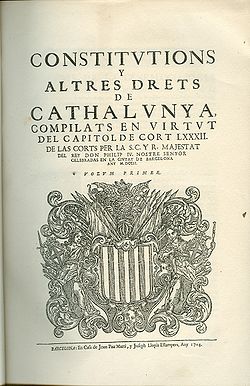- Catalan constitutions
-
The Catalan/Valencian cultural domain  1702 compilationLanguageHistory · Grammar · Phonology · Orthography
1702 compilationLanguageHistory · Grammar · Phonology · Orthography
Institut d'Estudis Catalans
Acadèmia Valenciana de la Llengua
Institut & Fundació Ramon LlullHistoryGeo-political divisionsGovernment and PoliticsGeneralitat de Catalunya · Generalitat Valenciana
Govern de les Illes Balears
General Council of the Valleys (Andorra)
General Council of the Pyrénées-Orientales
Politics of Andorra · Politics of Catalonia
Catalanism · ValencialismTraditions and SymbolsCastells · Correfoc · Gegants i capgrossos · Falles
Nit de Sant Joan · Moros i cristians · St George's Day
Caganer · Tió de Nadal · Muixeranga · Sardana
Coca · Pa amb tomàquet · Paella · Ensaïmada
Symbols · Myths and legendsArtsDecadència · Renaixença · Modernisme · Noucentisme
Ramon Llull · Ausiàs March · Jacint Verdaguer
Antoni Gaudí · Salvador Dalí · Joan Miró
Joaquim Sorolla · Antoni Tàpies · Lluís Llach
Rumba catalana · Rock català · Nova cançó
Literature · MusicThe Catalan constitutions (Catalan: Constitucions catalanes, IPA: [kunstitusiˈons kətəˈɫanəs]) were promulgated by the Corts of Barcelona (corts being the Catalan for courts). The first constitution was promulgated by the court of 1283. The last ones were promulgated by the court of 1702. The compilations of the constitutions and other rights of Catalonia followed the Roman tradition of the Codex.
Contents
Origin: The Corts of Barcelona
The first compilation was prescribed by Ferran I, and suggestion by the courts of Barcelona from 1413. It spread in edition of the 1495, together with the Usages of Barcelona:
- Usatges of Barcelona, constitutions, chapters and acts of court and other laws of Catalonia.
The compilations agreed in the courts of 1585 and of 1702 were published in three volumes:
- Constitucions i altres drets de Catalunya ("Constitutions and other rights of Catalonia")
- Pragmàtiques i altres drets de Catalunya ("Pragmatics and other rights of Catalonia"
- Constitucions i altres drets de Catalunya superflus, contraris i corregits ("Constitutions and other rights of Catalonia, Irrelevant, Contrary, and Corrected")
De jure abolition: Els Decrets de Nova Planta
Shortly after the end of the War of the Spanish Succession, Philip V of Spain issued the set of decrees known in Spanish as the Decretos de Nueva Planta and in Catalan as the Decrets de Nova Planta. This series of decrees abolished the separate laws of the territories that supported his rival to the throne, the Archduke Charles of Austria; this included all territories of the Crown of Aragon. The Decretos attempted to make Spain into a centralized state on the model of France, applying the laws of Castile to all of Spain. These acts were promulgated in Valencia and Aragon in 1707, and were extended in 1716 to Catalonia and the Balearic Islands (with the exception of Menorca, a British colony at the time).
Thus, the Catalan Constitutions were effectively abolished by the King's authority after his military victory, rather than through any legislative process within Catalonia itself. The change ignored the Catalan Constitutions' own provisions for how they were to be amended or reformed.
Restoration promise: The Third Carlist War
During the Third Carlist War (1872-1876), the Carlist forces managed to occupy some cities in the Catalan interior. Isabel II was in exile and King Amadeo I had reigned since 1871, although he was not generally popular. The pretender Charles VII of Spain, grandson of Charles V of Spain (hence Carlist from Carlos, "Charles"), promised the Catalans, Valencians and Aragonese the return of their Charters or fueros (Catalan: furs) and the constitutions that Philip V had previously abolished.
The promise was never fulfilled, as the Carlist revolt did not succeed. Carlos María de los Dolores finally departed for France, 27 February 1876, the same day that Alfonso XII of Spain entered Pamplona.
See also
- Catalan Grand Company
- Principality of Catalunya
- Parliament of Catalunya
- Decretos de Nueva Planta
References
- Constitucions de Catalunya del 1495 on Wikisource.
- Furs, capítols, provisions e actes de cort fets y atorgats per la S.C.R.M. del rey don Phelip nostre senyor, ara gloriosamente regnant. Monçó, 1626 ("Fueros, chapters, provisions and acts of court made and awarded by the S.C.R.M. of King Philip our lord, who reigns gloriously") on Wikisource.
- Constitutions y altres drets de Cathalunya, Barcelona, 1704 on Wikisource.
- Chapters of the Courts of Montsó digitalized, at the Spanish Office of Culture record image (fragment referent to the Consulate of the Sea.)
External links
Categories:- 1283 in law
- 1413 in law
- 1495 in law
- 1535 in law
- 1585 in law
- 1702 in law
- History of Catalonia
- Politics of Catalonia
- Legal history of Spain
- Defunct constitutions
- Catalan symbols
Wikimedia Foundation. 2010.
